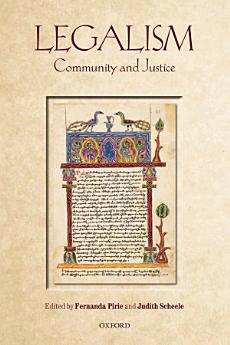Legalism: Community and Justice
Fernanda Pirie · Judith Scheele
авг 2014. · OUP Oxford
Е-књига
260
Страница
family_home
Испуњава услове
info
reportОцене и рецензије нису верификоване Сазнајте више
О овој е-књизи
'Community' and 'justice' recur in anthropological, historical, and legal scholarship, yet as concepts they are notoriously slippery. Historians and lawyers look to anthropologists as 'community specialists', but anthropologists often avoid the concept through circumlocution: although much used (and abused) by historians, legal thinkers, and political philosophers, the term remains strikingly indeterminate and often morally overdetermined. 'Justice', meanwhile, is elusive, alternately invoked as the goal of contemporary political theorizing, and wrapped in obscure philosophical controversy. A conceptual knot emerges in much legal and political thought between law, justice, and community, but theories abound, without any agreement over concepts. The contributors to this volume use empirical case studies to unpick threads of this knot. Local codes from Anglo-Saxon England, north Africa, and medieval Armenia indicate disjunctions between community boundaries and the subjects of local rules and categories; processes of justice from early modern Europe to eastern Tibet suggest new ways of conceptualizing the relationship between law and justice; and practices of exile that recur throughout the world illustrate contingent formulations of community. In the first book in the series, Legalism: Anthropology and History, law was addressed through a focus on local legal categories as conceptual tools. Here this approach is extended to the ideas and ideals of justice and community. Rigorous cross-cultural comparison allows the contributors to avoid normative assumptions, while opening new avenues of inquiry for lawyers, anthropologists, and historians alike.
О аутору
Fernanda Pirie is University Lecturer in socio-legal studies at the University of Oxford, and Director of the University's Centre for Socio-Legal Studies. An anthropologist by training, following a career at the London Bar, she has carried out fieldwork for over a decade on the Tibetan plateau. Her studies have centred on conflict resolution, social order, and tribe-state relation. She is the author of The Anthropology of Law (2013). Judith Scheele is a social anthropologist and a post-doctoral research fellow at All Souls College, Oxford. Her research focuses on North Africa and the Sahara, in particular Algeria, Mali, and Chad. Her publications include Village Matters: Knowledge, Politics and Community in Kabylia (2009) and Smugglers and Saints of the Sahara: Regional Connectivity in the Twentieth Century (2012). The authors are among the coordinators of the Oxford Legalism project, which brings together scholars from law, history, anthropology, classics, and oriental studies in a series of seminars and workshops, to compare examples of legalistic thought, texts, and practices, from across the world.
Оцените ову е-књигу
Јавите нам своје мишљење.
Информације о читању
Паметни телефони и таблети
Инсталирајте апликацију Google Play књиге за Android и iPad/iPhone. Аутоматски се синхронизује са налогом и омогућава вам да читате онлајн и офлајн где год да се налазите.
Лаптопови и рачунари
Можете да слушате аудио-књиге купљене на Google Play-у помоћу веб-прегледача на рачунару.
Е-читачи и други уређаји
Да бисте читали на уређајима које користе е-мастило, као што су Kobo е-читачи, треба да преузмете фајл и пренесете га на уређај. Пратите детаљна упутства из центра за помоћ да бисте пренели фајлове у подржане е-читаче.





